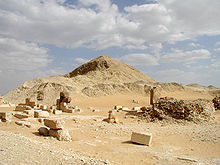Pyramid Texts
Appearance

Pyramid Texts are inscriptions inside the pyramids of the 5th and 6th dynasty Pharaohs, and of their wives. They mostly take the form of spells or "utterances" to protect the Pharaoh's body and help him toward his afterlife in the heavens.
The Pyramid of Unas (d. c. 2345 BC)
[edit]
He has come to thee … Great One; he has come to thee, Great-in-magic...

- Re and Thoth, take me with you, that I may eat of what you eat, that I may drink of what you drink, that I may live on what you live on, that I may sit on what you sit on, that I may be strong through that whereby you are strong, that I may sail in that in which you sail.
- Utterance 210, as translated by Raymond O. Faulkner in The Ancient Egyptian Pyramid Texts (1969) p. 39.
- Thou purifiest thyself in the dew of the stars.
- Utterance 214, as translated by Samuel A. B. Mercer in The Pyramid Texts (1952)
- The messengers of thy Ka are come for thee; the messengers of thy father are come for thee; the messengers of Rē are come for thee.
Go after thy sun; purify thyself, thy bones are female-falcons, goddesses, who are in heaven, that thou mayest be at the side of the god.- Utterance 214
- Atum, bring me up to you, encircle me inside your arms. There is no star-god without his companion: I am your companion.
- Utterance 215, as translated by James P. Allen in The Ancient Egyptian Pyramid Texts (2005), edited by Peter Der Manuelian, p. 31.
- Who surpasses thee, who is more like thee, who is more weary than thou, who is greater than thou, who is fresher than thou, who is more praised than thou. Thy time of silence about it is no more.
- Utterance 218
- The two doors of the horizon are open; its bolts slide.
He has come to thee … Great One; he has come to thee, Great-in-magic … He is pure for thee; he is in awe of thee.
Mayest thou be satisfied with him; mayest thou be satisfied with his purity; mayest thou be satisfied with his word, which he speaks to thee:
"How beautiful is thy face, when it is peaceful, new, young, for a god, father of the gods, has begotten thee!"
He has come to thee, Great-in-magic … It is Horus, who has fought in protection of his eye, Great-in-magic.- Utterance 220, , as translated by Samuel A. B. Mercer The Pyramid Texts (1952). [1]
- Opened are the double doors of the horizon; unlocked are its bolts.
- Utterance 220, as translated by James Henry Breasted Development of Religion and Thought in Ancient Egypt (1912), p. 114.
- Clouds darken the sky,
The stars rain down,
The Bows [a constellation] stagger,
The bones of the hell-hounds tremble,
The porters are silent,
When they see king Unis,
Dawning as a soul,
As a god living on his fathers,
Feeding on his mothers.- Utterance 273, as translated by James Henry Breasted Development of Religion and Thought in Ancient Egypt (1912) p. 127.
The Pyramid of Teti (d. c. 2333 BC)
[edit]
The great ones surround you,
The watchers wait on you...
- The hidden ones worship you,
The great ones surround you,
The watchers wait on you,
Barley is threshed for you,
Emmer is reaped for you,
Your monthly feasts are made with it,
Your half-month feasts are made with it,
As ordered done for you by Geb, your father,
Rise up, O Teti, you shall not die!- Utterance 373
- Stand at the gates that bar the common people!
The gatekeeper comes out to you,
He grasps your hand,
Takes you into heaven, to your father Geb.
He rejoices at your coming,
Gives you his hands,
Kisses you, caresses you,
Sets before you the spirits, the imperishable stars.- Utterance 373, as translated by Miriam Lichtheim Ancient Egyptian Literature Vol. 1 ([1975] 2006) pp. 41-42.
The Pyramid of Pepi II Neferkare (d. c. 2184 BC)
[edit]
- He flies who flies; this king Pepi flies away from you, ye mortals. He is not of the earth, he is of the sky …This king Pepi flies as a cloud to the sky, like a masthead bird; this king Pepi kisses the sky like a falcon.
- Utterance 467, as translated by James Henry Breasted Development of Religion and Thought in Ancient Egypt (1912) p. 109.
- Thou art the Great One in Abydos, thou art the Morning Star which appears in the eastern part of heaven, to which Horus of the Tuat has given his body. O great and exalted one among the imperishable stars, thou shalt never perish.
- Utterance 509, as translated by E. A. Wallis Budge Osiris and the Egyptian Resurrection ([1911] 1973) p. 159.

